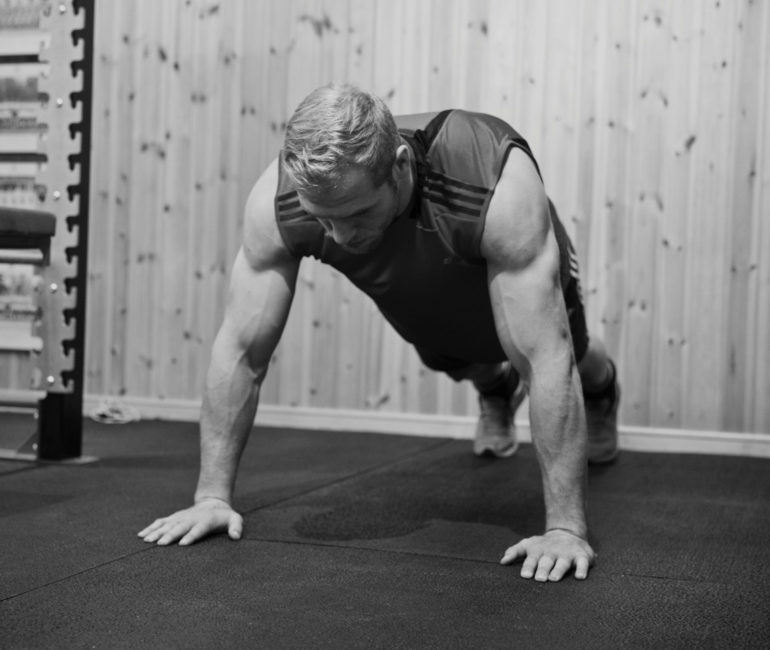James Haskell: 11 tips to becoming a stronger, faster runner
England rugby player, James Haskell, shares tips for improving your PB…
–
I need to start by declaring I am not a huge fan of running, jogging or whatever your preferred terminology might be. I have to engage in it but let’s put it this way, I wouldn’t beat a path to the back door on my day off. However I am passionate about sport in general and the fundamentals and mechanics of exercise.
There is so much general nonsense, hyperbole, cant, call it what you will, written about exercise in particular or in general that very occasionally I feel the need to stick my head above the parapet. Never I trust as a die-hard sporting evangelist, spouting fire and brimstone about it being my way or the highway. Instead I hope far more restrained and evidential. I feel this way about running when I read some of the tosh written about it.

James Haskell gives his tips for improving your running time
If you’re looking to become a faster runner and start shaving serious seconds from your race day PBs, you’ve probably been pedalled the usual advice time and time again. According to many of the self-proclaimed ‘experts,’ the key to progressing as a runner is simply a case of putting in more miles each week, more hours pounding the pavement. Practice makes perfect, they say, so lace up and get back out on the road.
Don’t listen to them.
Because, whilst putting regular miles on the clock is an important way to keep you well drilled in the art of running, the key to progression is what you do away from the pavement. Complementing your regular runs with the correct mobility and resistance training, along with a well thought out nutrition and recovery protocol, will accelerate your progress far more quickly.
With that in mind, here are 11 tips to become a faster runner – none of which involve any more time out on the pavement!
#1 – Power Drills
Perform at least one power session per week to help build the leg strength you need to get faster. Contrary to popular belief, runners don’t need to have stick-thin legs to be quick. Developing strength and power in your legs will help improve your speed and balance, whilst protecting your knee and ankle joints against the unrelenting pavement.
Sprint sessions, running with high knees, skipping and bounding (running with extra-large strides) are excellent ways to activate your fast twitch muscle fibres and improve the power in your legs.
#2 – Variety runs
Rather than repeating the same speeds and distances on each run, keep things varied to keep your body guessing. Shorten the distance and increase the speed for one session, and throw in some intervals for the next. Remember, your body will only adapt and make progress when pushed to its limit. Running the same route every session is just not going to cut it.
#3 – Billat 30-30s
If you’ve never heard of Billat 30-30s before, then listen up. Designed by French exercise physiologist Veronique Billat, 30-30s are designed to provide the maximum VO2 max boost in the least amount of time. In other words, perform these regularly and watch your stamina skyrocket.
Billat 30-30s are easy to implement into any training session – simply run for 30 seconds at around 80% output (slightly below a sprint), then jog lightly for the following 30 second. Repeat this process 15 – 20 times. It’s not easy, but it sure delivers results.
#4 – Train with resistance
It goes without saying, but if you want to build power in your legs, you’re going to have to incorporate some resistance training into your programme. Don’t go too heavy though – work in the 10 – 15 rep range at around 50 – 60% of your 1RM. Focus on explosive movements with a fast concentric phase in order to maximise your power output.
#5 – Hit the hills
For further variety in your training programme, head out to the hills for some sprint training. Not only will this help condition you for the sprint finish at the end of a race, it is also the most effective fat burning exercise that you can add to your arsenal. Lower body fat means less weight to carry, helping to improve your overall speed and stamina.
#6 – Mobilise
Keeping your joints healthy is one of the most important things you can do as a runner. Make time for mobility work each day, ideally first thing in the morning. Pay particular attention to your ankles, knees and hip flexors, which take the biggest pounding when you’re out on the road.
#7 – Fuel up
If you’re putting in the hard yards, you’re going to need the extra calories to compensate. When athletes start running, they often fall into the trap of not increasing their food intake in line with their new rate of energy expenditure – but if you want to recover properly and perform at your best, make sure you are getting enough high quality food.
#8 – Eat enough iron
Iron is one of the most important performance boosting nutrients for runners. As well as playing an important role in the conversion of sugars to energy, iron also helps to carry oxygen around the blood; reducing lactic acid build up to keep you going for longer. Red meat, spinach and dark chocolate are all excellent sources of this vital mineral.
#9 – …And potassium
Potassium assists in the conversion of carbohydrates into muscle glycogen, and also helps prevent muscle soreness. The best sources of potassium are bananas, sweet potatoes, avocadoes and coconut water.
#10 – Hydrate
Extra miles, especially in the heat of the day, means more fluid lost during sweat. Improper hydration will affect both your performance and your recovery, so be sure you are taking on enough water both during training and throughout the rest of the day. Aim for around 3 litres per day on training days, and consider adding a high quality hydration supplement such as H2Pro to your water bottle.
#11 – Sleep
Last but not least, prioritise high quality sleep every night in order to maximise your recovery and performance the next day. Aim for 8 hours each night. To help improve your sleep quality, consider taking a magnesium supplement and / or a herbal tea such as chamomile 30 minutes before bed. The importance of good sleep cannot be underestimated – both for your sporting performance and general health!
James Haskell Health & Fitness helps you achieve a healthier and fitter lifestyle
We do this delivering professional fitness and nutrition advice in a simple, clear and easy to understand format. In conjunction with the development of our own range of clean and certified sports supplements, this allows the individual to achieve the lifestyle balance, which is right for them.
If you want to know more about Health, Nutrition and Fitness then please visit our website www.jameshaskell.com
Please send us your questions and any comments you would like to make, via our social media channels. Plus if you feel informed by what you have read, please share the information using #JHHF #RugbyFit #jhtraining
Twitter – @jameshaskellhf
Instagram @jameshaskellhf
Don’t forget our all natural, multiple award-winning Pre-Training supplement, specifically designed to aid and boost your training. All our supplements are Informed Sport batch tested, so there are no additives or harmful chemicals. Informed Sport Tested and certified products are the only supplements, which members of the armed services and elite athletes can safely take. www.jameshaskell.com/supplements








